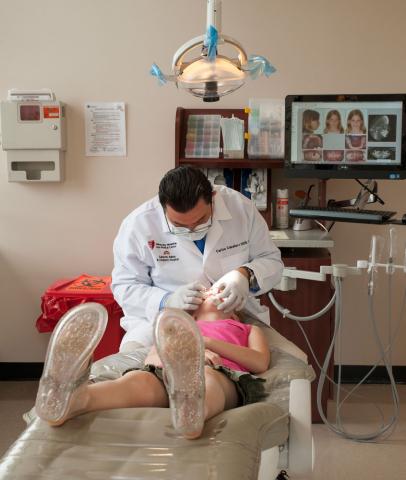What is a craniofacial orthodontist?
Orthodontists are dental specialists who diagnose and treat problems with the position, alignment or spacing of the teeth, and related irregularities in the face and the jaw. We use a number of special treatments, including braces and other oral appliances, to correct these problems. Orthodontists who treat patients with craniofacial anomalies are specially trained to address the complex issues that such patients present.
When should orthodontic treatment be started?
For patients being treated for craniofacial anomalies, this is a decision that will be made by your treatment team.
Does getting braces hurt? What about wearing them?
Having braces put on is generally painless. Some people experience minor aches and pains in the first couple of days or so, as they adjust to wearing their appliances; periodic adjustments may sometimes cause soreness as well, though it typically lasts only a short time. Over-the-counter pain relievers can be used to alleviate any discomfort, but are usually unnecessary.
How long will treatment take?
It's different for each person, but generally the active stage of treatment (that is, wearing braces or other appliances) may take from 6-30 months. After that, a retainer is worn for at least several months more.
How often will I come in for an appointment?
It depends on what's being done, and how often you need to be monitored. During active treatment, you'll typically come in to our office once every 4 to 10 weeks.
Will I need to have any teeth extracted?
If your teeth are severely crowded (because your mouth is too small to properly accommodate all of them) — or if you have impacted teeth (teeth that are trapped beneath the gum line by other teeth) — then extractions may be necessary. In the case of younger patients, early treatment may make extraction unnecessary.
faq1
Will I have to watch what I eat?
Yes — you should pass up the types of foods that could damage or become trapped in your braces. Some of these include raw vegetables, hard candy, caramel, taffy, and ice cubes (fortunately, ice cream is OK). We will give you a list of foods to avoid.
Will I be able to play sports/ play my instrument?
In a word: yes. Of course, whether you wear braces or not, we recommend you wear a mouthguard when playing most sports. Musicians are generally able to play their instruments just as they did before, but they may need a short adjustment period after getting braces.
Do I still need to see my regular dentist while I am getting orthodontic treatment?
You do — in fact, it is more important than ever. Keeping teeth free of plaque (and potentially, decay) can be challenging when you're wearing braces. Your dentist can help you avoid these problems with frequent cleanings and exams.


